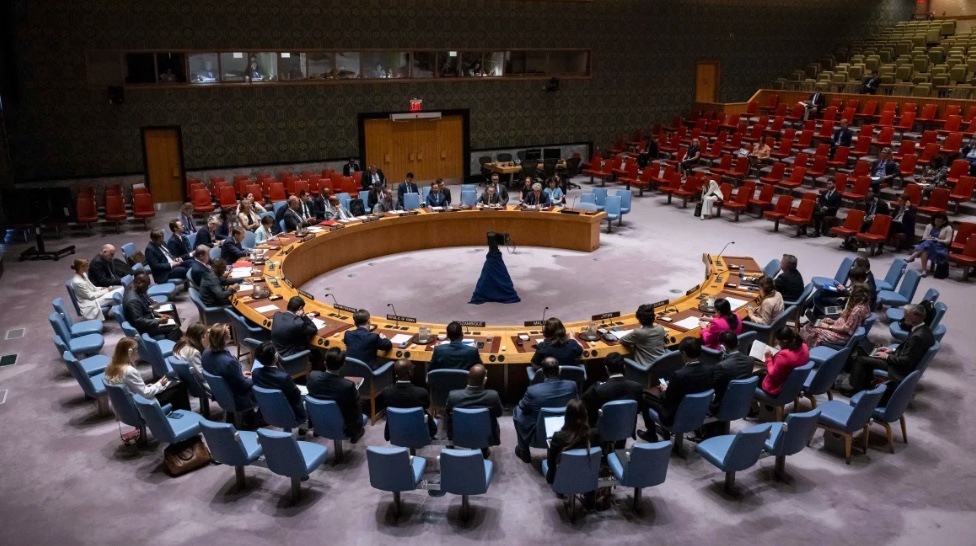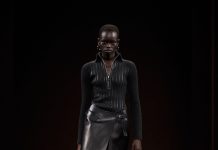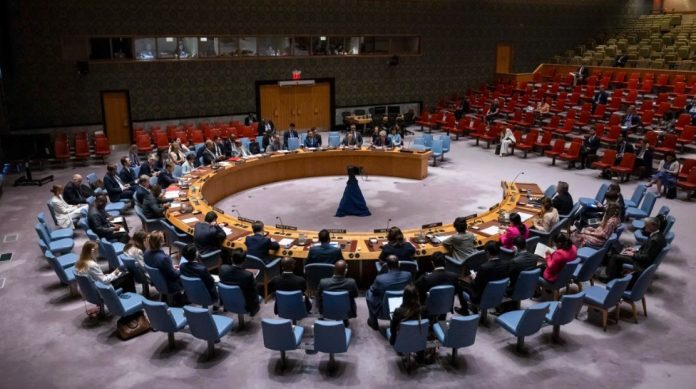ในแมนฮัตตัน กลุ่มผู้ทรงอำนาจกลุ่มหนึ่งที่ UN มีความโดดเด่น ได้แก่ คณะมนตรีความมั่นคง ซึ่งปกครองโดยห้าประเทศ (สหรัฐอเมริกา จีน รัสเซีย ฝรั่งเศส และสหราชอาณาจักร) นับตั้งแต่สงครามโลกครั้งที่สอง แม้จะหมุนเวียนสมาชิกไม่ถาวร แต่ไม่มีประเทศใดในตะวันออกกลาง แอฟริกา ละตินอเมริกา หรือแคริบเบียนที่มีอำนาจยับยั้งสมาชิกถาวรเหล่านี้ อำนาจยับยั้งทำให้สมาชิกถาวรหรือที่รู้จักในชื่อ P5 สามารถขัดขวางมติใดๆ ก็ได้ ตั้งแต่ภารกิจรักษาสันติภาพไปจนถึงการลงโทษ เพื่อปกป้องผลประโยชน์ของประเทศและตัวเลือกนโยบายต่างประเทศ อย่างไรก็ตาม มีแรงผลักดันครั้งใหม่ที่จะปฏิรูประบบโลกยุคอาณานิคมนี้ ในขณะที่ผู้นำโลกเตรียมรวมตัวกันที่สำนักงานใหญ่สหประชาชาติสำหรับการประชุมสมัชชาใหญ่ประจำปีในเดือนกันยายนนี้ ประธานาธิบดีจูเลียส มาอาดา ไบโอของเซียร์ราลีโอนได้ย้ำข้อเรียกร้องที่มีมายาวนานของแอฟริกาในการปฏิรูปสภา ซึ่งรวมถึงการเพิ่มที่นั่งสมาชิกถาวรใหม่สองที่นั่งสำหรับประเทศในแอฟริกา
ประเด็นปัญหาในแอฟริกาครอบงำเกือบ 50% ของงานของคณะมนตรีความมั่นคงแห่งสหประชาชาติ แต่แอฟริกายังคงถูกนำเสนอน้อยเกินไป ประธานาธิบดีจูเลียส มาดา ไบโอของเซียร์ราลีโอนกล่าว นักการทูตอาวุโสของสหประชาชาติบันทึกถึงอิทธิพลที่สำคัญของแอฟริกาในหมู่กลุ่ม P5 ซึ่งตัดสินใจเรื่องการปฏิรูป แม้จะมีการหยุดชะงักบ้าง แต่มติของสภาก็ยังได้ผล การผลักดันการปฏิรูปกำลังได้รับแรงผลักดัน โดยประธานาธิบดีโจ ไบเดน แห่งสหรัฐฯ สนับสนุนที่นั่งถาวรสำหรับแอฟริกา ละตินอเมริกา และแคริบเบียน มีแง่ดีว่าสมัชชาใหญ่เดือนกันยายนจะเดินหน้าการปฏิรูป แม้ว่าการขยายสภาในเดือนกันยายนดูไม่น่าเป็นไปได้ แต่ “เราอาจเห็นแผนการเพื่อให้บรรลุผลสำเร็จภายในกรอบเวลาที่เหมาะสม” อเล็กซานเดอร์ มาร์ชิค ทูตสหประชาชาติของออสเตรีย กล่าว สมัชชาใหญ่ได้ยืนยันอีกครั้งถึงบทบาทของตนในการปฏิรูปสภา และจะรวมประเด็นนี้ไว้ในวาระการประชุมที่กำลังจะมีขึ้น
นอกเหนือจากการผลักดันของสหภาพแอฟริกาให้มีที่นั่งในสภาถาวรสองที่นั่งและที่นั่งไม่ถาวรสองที่นั่งแล้ว ยังมีกลุ่มรัฐสมาชิกของสหประชาชาติอีกอย่างน้อยห้ากลุ่มที่มีแนวคิดการปฏิรูปที่แตกต่างกัน ตัวอย่างเช่น การถอดอำนาจยับยั้งออกจากกลุ่ม P5 (สหรัฐฯ รัสเซีย และจีน) ถือเป็น “กลุ่มที่ไม่ใช่ผู้เริ่มต้น” ตามที่นักการทูตอาวุโสของสหประชาชาติระบุ อย่างไรก็ตาม “การปฏิรูปแบบไม่เป็นทางการ” อาจเป็นไปได้ ผู้เชี่ยวชาญแนะนำ พวกเขาชี้ไปที่ความคิดริเริ่มในปี 2565 ของLiechtenstein ซึ่งได้รับการรับรองโดยสมัชชาใหญ่ ซึ่งกำหนดให้ต้องมีการถกเถียงกันในที่ประชุมสมัชชาใหญ่ว่าด้วยการยับยั้ง P5 แม้ว่าจะไม่สามารถยกเลิกการยับยั้งได้ แต่ก็ทำให้ต้นทุนทางการเมืองสำหรับ P5 เพิ่มขึ้น การขยายสภาถูกมองว่าเป็นไปได้ คล้ายกับการขยายสมาชิกจาก 10 คนเป็น 15 คนในปี 2506 “ความจริงที่ว่าผู้คนกำลังพูดคุยกันเรื่องนี้ หมายความว่ามีแรงผลักดันมากขึ้น” นักการทูตอาวุโสคนหนึ่งกล่าว
The renewed effort to reform the UN’s colonial-era global system.

In Manhattan’s exclusive circles, one powerful group at the UN stands out: the Security Council, dominated by five countries (the US, China, Russia, France, and the UK) since World War II. Despite rotating non-permanent members, no nation from the Middle East, Africa, Latin America, or the Caribbean has the veto power of these permanent members. The veto power allows the permanent members, known as the P5, to block any resolution—from peacekeeping missions to sanctions—in defence of their national interests and foreign policy choices. However, there is a renewed drive to reform this colonial-era global system. As world leaders prepare to gather at the UN headquarters for the annual General Assembly this September, Sierra Leone’s President Julius Maada Bio has reiterated Africa’s long-standing call for reforming the council, including adding two new permanent member seats for African countries.
African issues dominate nearly 50% of the UN Security Council’s work, yet Africa remains “grossly underrepresented,” says Sierra Leone’s President Julius Maada Bio. A senior UN diplomat notes Africa’s significant influence among the P5, who decide on reforms. Despite some deadlocks, the council’s resolutions have been effective. The push for reform is gaining momentum, with US President Joe Biden supporting permanent seats for Africa, Latin America, and the Caribbean. There is optimism that the September General Assembly will advance reform efforts. While council expansion in September seems unlikely, “we might see a plan for achieving it within a reasonable timeframe,” said Marschik. The General Assembly has reaffirmed its role in council reform and will include the issue in the upcoming session’s agenda.
In addition to the African Union’s push for two permanent and two non-permanent council seats, there are at least five other groups of UN member states with different reform ideas. For instance, removing veto powers from the P5 (the US, Russia, and China) is considered a “non-starter,” according to a senior UN diplomat. However, “lowercase reform” might be feasible, experts suggest. They point to a 2022 initiative by Liechtenstein, adopted by the General Assembly, which requires any P5 veto to be debated in the General Assembly. While it cannot overturn a veto, it increases the political cost for the P5. Enlarging the council is seen as a possibility, similar to the 1963 expansion from 10 to 15 members. “The fact that people are discussing it means there’s more traction,” said a senior diplomat.
By CNN NEWS

















